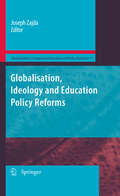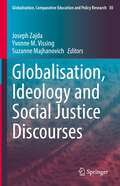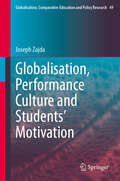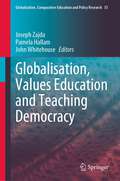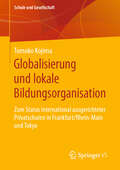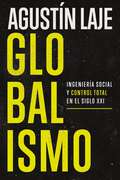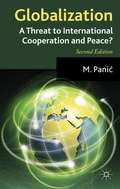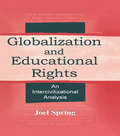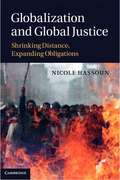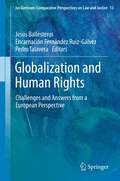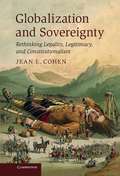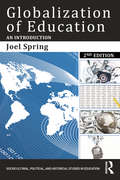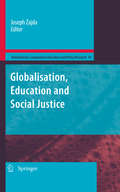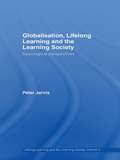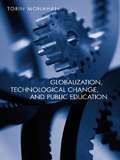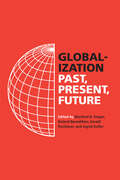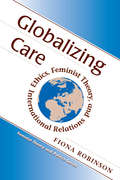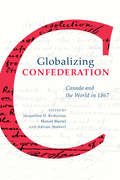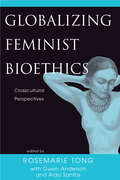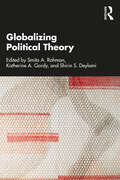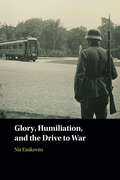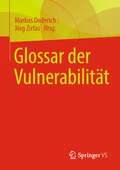- Table View
- List View
Globalisation, Ideology and Education Policy Reforms
by Joseph ZajdaThe eleventh in the 12-volume book series Globalisation, Comparative Education and Policy Research, this work sets out to explore the interrelationship between ideology and education reforms, setting it in a global context. With this as its focus, the chapters represent hand-picked scholarly research on major discourses in the field of comparative education. A compendium of the very latest thinking on the subject, this volume is, like the others in the series, a state-of-the-art sourcebook for researchers, practitioners and policymakers alike. Not only do the chapters offer a timely overview of current issues affecting comparative education and education policy research in what is now a global educational culture, but the work also contains ideas about future directions that policy reforms could take. The book draws upon recent studies in the areas of globalisation, equity, and the role of the State. It explores conceptual frameworks and methodological approaches applicable in the research covering the State, globalisation, and education reforms. The research evinces the neo-liberal ideological imperatives of current education and policy reforms, and illustrates the way that shifts in the relationship between the State and education policy affect current trends in education reforms and schooling globally. Individual chapters critically assess the dominant discourses and debates on comparative education research in education and policy reforms. Using diverse comparative education paradigms from critical theory to globalisation, the authors focus on globalisation, ideology and democracy and examine both the reasons and outcomes of education reforms, policy change and transformation. They provide a more informed critique of models of accountability, quality and school effectiveness that are informed by Western social values. The book also draws upon recent studies in the areas of equity, cultural capital and dominant ideologies in education.
Globalisation, Ideology and Social Justice Discourses (Globalisation, Comparative Education and Policy Research #30)
by Joseph Zajda Suzanne Majhanovich Yvonne M. VissingThis book examines dominant discourses in social justice education globally. It presents cutting-edge research on the major global trends in education, social justice and policy research. Using diverse paradigms, ranging from critical theory to discourse analysis, the book examines major social justice and equity education reforms and policy issues in a global culture, with a focus on the ambivalent and problematic relationship between social justice education discourses, ideology and the state. The book discusses democracy, ideology and social justice, which are among the most critical and significant factors defining and contextualising the processes surrounding social justice education reforms globally. It critiques current social justice education practices and policy reforms, illustrating the shifts in the relationship between the state, ideology, and social justice education policy.Written by authors from diverse backgrounds and regions, this book examines current developments in research concerning social justice education. It enables readers to gain a more holistic understanding of the nexus between social justice education, and dominant ideologies, both locally and globally. It also provides an easily accessible, practical, yet scholarly insights into local and global trends in the field of social justice education. Discourses of Globalization, Ideology and Social Justice, with contributions from key scholars worldwide, should be required reading for a broad spectrum of users, including policy-makers, academics, graduate students, education policy researchers, administrators, and practitioners.
Globalisation, Nation-Building and History Education (Globalisation, Comparative Education and Policy Research #40)
by Joseph Zajda John WhitehouseThis book uses historiography and discourse analysis to provide a new insight into understanding the nexus between ideologies, the state, and nation-building—as depicted in history school textbooks. It focuses on the interpretation of social and political change, significant events, and examining possible new biases and omissions in school textbooks. The ‘Europeanization’ of history textbooks in the EU is an example of western-dominated Grand Narrative of pluralist democracy, multiculturalism, and human rights, according to the canon of a particularly European dimension. Various public debates in the USA, China, the Russian Federation (RF), Japan, and elsewhere, dealing with understandings of a nation-building, national identity, and history education point out to parallels between the political significance of school history and the history education debates globally.The book demonstrates that the issue of national identity and balanced representations of the past continue to dominate the debate surrounding the goals, dominant ideologies and content of history textbooks, and historical narratives. It concludes that competing discourses and ideologies will continue to define and shape the nature and significance of historical knowledge, ideologies and the direction of values education in history textbooks. This book provides an easily accessible, practical, yet scholarly insights into local and global trends in the field of history education, and should be required reading for a broad spectrum of users, including policy-makers, academics, graduate students, education policy researchers, administrators, and practitioners.
Globalisation, Performance Culture and Students’ Motivation (Globalisation, Comparative Education and Policy Research #49)
by Joseph ZajdaThis book analyses education policy trends that affects performing culture, academic excellence and global competitiveness in schools. It focuses on students’ cultural identities and engagement, inclusive schooling, eliminating discrimination and discriminatory practices in the classroom, and relevant values education. One of the major effects of cultural and economic forces of globalisation is that schools and school leaders, like other educational organisations, having modelled their goals and strategies on the entrepreneurial business model. They are compelled to embrace the corporate ethos of efficiency, accountability, performance, and profit-driven managerialism. This corporate ethos reflects a dominant neo-liberal ideology, which exerts a powerful influence on major discourses of democracy, equality, social justice, and education, both locally and globally. By examining the education policy shifts in the use of major discourses concerning performing culture and education, this book offers a comprehensive synthesis of the intersecting and diverse discourses of globalisation, cultural diversity, performing culture, and education. It provides innovative ideas concerning the future directions for authentic models of globalisation, performance culture and students’ motivation.
Globalisation, Values Education and Teaching Democracy (Globalisation, Comparative Education and Policy Research #35)
by Joseph Zajda Pamela Hallam John WhitehouseThis book critiques dominant discourses and debates pertaining to values education, cultural identity and teaching democracy, set against the backdrop of growing social stratification and unequal access to quality education. It addresses discourses concerning globalisation, ideologies and the state, as well as approaches to values education and teaching democracy in schools. The book explores the ambivalent and problematic connections between the state, globalisation, values education and teaching democracy. It also explores conceptual frameworks and methodological approaches applicable to research on values education, multiculturalism and identity politics. Drawing on diverse paradigms, ranging from critical theory to globalisation, and by focusing on globalisation, ideology and values education, the book critically examines research dealing with cultural diversity and its impact of identity politics. Given the need for a multiple perspective approach, the authors have diverse backgrounds and hail from different countries and regions, offer a wealth of insights, contributing to a more holistic understanding of the nexus between values education, multiculturalism and national identity. With contributions from key scholars worldwide, the book should be required reading for a broad spectrum of users, including policy-makers, academics, graduate students, education policy researchers, administrators and practitioners.
Globalisierung und lokale Bildungsorganisation: Zum Status international ausgerichteter Privatschulen in Frankfurt/Rhein-Main und Tokyo (Schule und Gesellschaft #71)
by Tomoko KojimaDie qualitative Vergleichsstudie beschäftigt sich mit der Frage, wie sich die lokale Bildungsorganisation gegenwärtig hinsichtlich der Globalisierung und der Präsenz der Privatschulen mit internationalem Profil verändert. Betrachtet werden exemplarische Fälle in zwei global cities, Frankfurt/Rhein-Main und Tokyo. Dabei werden unterschiedliche Formen international ausgerichteter Privatschulen sowie ihre Differenzierung von bzw. Identifikation mit dem lokalen Bildungskontext aufgezeigt. Die damit einhergehende Überschreitung von Grenzen im nationalstaatlichen Erziehungssystem und deren Folgen werden semantisch aus der Governance-Perspektive sowie aus systemtheoretischer Sicht regional kontrastierend diskutiert.
Globalismo: Ingeniería social y control total en el siglo XXI
by Agustin LajeDesvela los mecanismos ocultos de la dominación mundial con Globalismo: Ingeniería social y control total en el siglo XXI. El exitoso autor Agustín Laje desentraña magistralmente la malvada realidad de nuestro mundo moderno e ilumina las tinieblas de las fuerzas de poder que tratan de controlar a la humanidad. El globalismo no es globalización, sino una demoledora ideología que supone el más ambicioso proyecto de ingeniería social y control total en curso. Institucionalizada en organizaciones que, por definición, no tienen ni patria, ni territorio ni pueblo, esta ideología pretende parir un régimen político antidemocrático de alcance global. Así la soberanía de las naciones se redistribuye entre organizaciones supranacionales como el Foro Económico Mundial o la ONU con su Agenda 2030, liberadas de las limitaciones de los intereses particulares de los pueblos, para coordinar las transformaciones necesarias para nuestra «supervivencia». El globalismo también propone nuevas formas de legitimidad basadas en la tecnocracia y la supuesta filantropía de organizaciones como la Fundación Gates, la Open Society de Soros, y la Fundación Rockefeller.En esta obra, Agustín Laje explica magistralmente el origen y la formación del contrato social de nuestros Estados nacionales sobre una base democrática, mostrando cómo el globalismo busca culpabilizar estas estructuras para llevarnos a un callejón sin salida, donde todo se cede a una gobernanza global no representativa, la máxima expresión de la oligarquía de unos pocos privilegiados a los que nadie votó, y que ante nadie rinden cuentas pero que pretenden dirigir el destino del planeta.El autor llama a todos los actores sociales, políticos, religiosos e intelectuales a unirse contra el globalismo. La paradoja de que los patriotas olviden sus fronteras para esta batalla cultural adquiere un nuevo significado. Conocer la verdad y denunciar la mentira es un arma valiosa que este libro ofrece.GlobalismUncover the secret workings of world domination with Globalism: Social Engineering and Total Control in the 21st Century. Best-selling author Agustín Laje masterfully unravels the sinister reality of our modern world and sheds light on the darkness of the forces of power that seek to control humanity.Globalism is not globalization, but rather a devastating ideology representing the most ambitious social engineering and total-control project currently underway.Institutionalized by organizations such as the World Economic Forum or the UN with its Agenda 2030, Globalism also promotes new forms of legitimacy based on &“technocracy&” and the supposed philanthropy of organizations such as the Gates Foundation, Soros&’ Open Society, and the Rockefeller Foundation.In this book, Agustín Laje skillfully explains the origin and formation of the social contract of our nation-States based on democracy, demonstrating how globalism seeks to blame these structures in order to steer us into a dead-end, where everything is handed over to a non-representative global governance. This represents the ultimate expression of an oligarchy formed by a few privileged elites who were elected by no one and are accountable to nobody, yet aim to dictate the destiny of the planet.The author calls on all social, political, religious, and intellectual figures to unite against globalism. The paradox of patriots disregarding their borders for this cultural battle takes on a new significance. Knowing the truth and denouncing the lie is a valuable weapon that this book offers.
Globalization
by M. PanicGlobalization and National Economic Welfare makes an original, powerful and timely contribution to a highly topical issue that affects all countries by showing why globalization is unsustainable in the long term without fundamental changes in existing attitudes and institutions. The book analyzes one of the most important aspects of economic policy at the beginning of the twenty-first century: how to overcome the growing threat that inequalities created by globalization pose to economic progress and political stability both nationally and internationally. Economic problems, from corporate fraud and bankruptcies to the high social costs of the adjustments that globalization imposes on individual countries, are becoming increasingly international and, consequently, demand action at the supranational level. Yet the effective institutional framework for dealing with these problems remains national. In contrast to the neo-liberal approach, the author argues that the state, as the only form of organization that has the power to reconcile conflicts of interest nationally and internationally, has a critical role to play in ensuring that globalization does not end in failure and war.
Globalization and Educational Rights: An Intercivilizational Analysis (Sociocultural, Political, and Historical Studies in Education)
by Joel SpringThis is the first book to explore the meaning of equality and freedom of education in a global context and their relationship to the universal right to education. It also proposes evaluating school systems according to their achievement of equality and freedom. Education in the 21st century is widely viewed as a necessary condition for the promotion of human welfare, and thus identified as a basic human right. Educational rights are included in many national constitutions written since the global spread of human rights ideas after World War II. But as a global idea, the meaning of educational rights varies between civilizations. In this book, which builds on the concept of the universal right to education set forth in Spring's The Universal Right to Education: Justification, Definition, and Guidelines, his intercivilizational analysis of educational rights focuses on four of the world's major civilizations: Confucian, Islamic, Western, and Hindu. Spring begins by considering educational rights as part of the global flow of ideas and the global culture of schooling. He also considers the tension this generates within different civilizational traditions. Next, he proceeds to: *examine the meaning of educational rights in the Confucian tradition, in the recent history of China, and in the Chinese Constitution; *look at educational rights in the context of Islamic civilization and as presented in the constitutions of Islamic countries, including an analysis of the sharp contrast between the religious orientation of Islamic educational rights and those of China and the West; *explore the problems created by the Western natural rights tradition and the eventual acceptance of educational rights as represented in European constitutions, with a focus on the development and prominence given in the West to the relationship between schooling and equality of opportunity; and, *investigate the effect of global culture on India and the blend of Western and Hindu ideas in the Indian constitution, highlighting the obstacles to fulfillment of educational rights created by centuries of discrimination against women and lower castes. In his conclusion, Spring presents an educational rights statement based on his intercivilizational analysis and his examination of national constitutions. This statement is intended to serve as a model for the inclusion of educational rights in national constitutions.
Globalization and Global Justice
by Nicole HassounThe face of the world is changing. The past century has seen the incredible growth of international institutions. How does the fact that the world is becoming more interconnected change institutions' duties to people beyond borders? Does globalization alone engender any ethical obligations? In Globalization and Global Justice, Nicole Hassoun addresses these questions and advances a new argument for the conclusion that there are significant obligations to the global poor. First, she argues that there are many coercive international institutions and that these institutions must provide the means for their subjects to avoid severe poverty. Hassoun then considers the case for aid and trade, and concludes with a new proposal for fair trade in pharmaceutical and biotechnology. Globalization and Global Justice will appeal to readers in philosophy, politics, economics and public policy.
Globalization and Human Rights
by Jesús Ballesteros Encarnación Fernández Ruiz-Gálvez Pedro TalaveraGlobalisation turns out to be untenable because it does not guarantee minimum social equity, peace and respect for the environment, and therefore does not guarantee the effective accomplishment of human rights. This book analyzes this issue and raises proposals for a new perspective. The first part describes the soft threats to human rights, derived from the devaluation of the politics and the productive economy with regard to the finance. It entails the concealment of the reality in the shape of exploitation as the tax havens and in the shape of marginalization of the persons with different abilities. The second part include a study of hard threats to human rights and examines two cases of failed states: Afghanistan and Somalia, in which the violence has supplanted the politics and the economy. In view of these situations it is necessary to rethink the force of classic ius gentium and the humanitarian right. The third part presents the European Union as a legal and political space in which conditions of a worthy life are better defended by means of the Primacy of Practical Reason and Social State of Law, and by the requirement of peace as the main rule of international relations.
Globalization and Sovereignty
by Jean L. CohenSovereignty and the sovereign state are often seen as anachronisms; Globalization and Sovereignty challenges this view. Jean L. Cohen analyzes the new sovereignty regime emergent since the 1990s evidenced by the discourses and practice of human rights, humanitarian intervention, transformative occupation, and the UN targeted sanctions regime that blacklists alleged terrorists. Presenting a systematic theory of sovereignty and its transformation in international law and politics, Cohen argues for the continued importance of sovereign equality. She offers a theory of a dualistic world order comprised of an international society of states, and a global political community in which human rights and global governance institutions affect the law, policies, and political culture of sovereign states. She advocates the constitutionalization of these institutions, within the framework of constitutional pluralism. This book will appeal to students of international political theory and law, political scientists, sociologists, legal historians, and theorists of constitutionalism.
Globalization of Education: An Introduction (Sociocultural, Political, and Historical Studies in Education)
by Joel SpringContinuing Joel Spring’s reportage and analysis of the intersection of global forces and education, this text offers a comprehensive overview and synthesis of current research, theories, and models related to the topic. Written in his signature clear, narrative style, Spring introduces the processes, institutions, and forces by which schooling has been globalized and examines the impact of these forces on schooling in local contexts. Significant conceptual frameworks are added to this Second Edition, specifically the “economization of education,” “corporatization of education” and the “audit state.” These concepts are embedded in the global educational plans of major organizations such as the World Bank, the Organization for Economic Development and Cooperation (OECD), World Economic Forum, and multinational corporations. Globalization of Education, Second Edition features new and updated information on • The World Bank• OECD and the United Nations• The World Trade Organization and the Global Culture of Higher Education• Corporatization of Global Education• Religious and Indigenous Education Models• The Global Workforce: Migration and the Talent Auction• Globalization and Complex Thought
Globalization, Education and Social Justice
by Joseph ZajdaGlobalization, Education and Social Justice, which is the tenth volume in the 12-volume book series Globalisation, Comparative Education and Policy Research, presents up-to-date scholarly research on major discourses concerning global trends in education, social justice and policy research. It provides an easily accessible, practical yet scholarly source of information about the international concern in the field of social justice, globalisation, and policy research. Above all, the book offers the latest findings to the critical issues in education and social justice globally. It is a sourcebook of ideas for researchers, practitioners and policy makers in education, globalisation and social justice education reforms around the world. It offers a timely overview of current issues in social justice affecting education policy research in the global culture. It provides directions in education, and policy research, relevant to transformational educational reforms in the 21st century. The book critically examines the overall interplay between globalisation, education reforms, and social justice. It draws upon recent studies in the areas of globalisation, social justice education reforms and the role of the State. It explores conceptual frameworks and methodological approaches applicable in the research covering the State, globalisation, equity, education, and social justice. It demonstrates the neo-liberal ideological imperatives of education and policy reforms, and illustrates the way the relationship between the State and education policy affects current models and trends in education reforms for social justice and schooling globally. Various book chapters critique the dominant discourses and debates pertaining to the politics of social justice and education globally and the newly constructed and re-invented models of neo-liberal ideology in education and policy reforms. Using a number of diverse paradigms in comparative education research, ranging from critical theory to post-structuralist discourses, the authors, by focusing on globalisation, social justice and democracy, attempt to examine critically both the reasons and outcomes of education reforms and policy change for social justice. The volume offers a more informed critique on the Western-driven models of education reforms and implications for social justice. The book also draws upon recent studies in the areas of equity, cultural capital and dominant ideologies in education. The general intention is to make Globalization, Education and Social Justice available to a broad spectrum of users among policy-makers, academics, graduate students, education policy researchers, administrators, and practitioners in the education and related professions.
Globalization, Lifelong Learning and the Learning Society: Sociological Perspectives (Lifelong Learning and the Learning Society)
by Peter JarvisThis book critically assesses the learning that is required and provided within a learning society and gives a detailed sociological analysis of the emerging role of lifelong learning with examples from around the globe. Divided into three clear parts the book: looks at the development of the knowledge economy provides a critique of lifelong learning and the learning society focuses on the changing nature of research in the learning society. The author, well-known and highly respected in this field, examines how lifelong learning and the learning society have become social phenomena across the globe. He argues that the driving forces of globalisation are radically changing lifelong learning and shows that adult education/learning only gained mainstream status because of these global changes and as learning became more work orientated.
Globalization, Technological Change, and Public Education
by Torin MonahanGlobalization, Technological Change, and Public Education documents the dramatic changes taking place in public education through the incorporation of new information technologies. These additions to the public school environment have generally been seen as enabling tools to help students and nations compete in the global marketplace. Yet a closer look at the interplay of technological change and organizational restructuring suggests the emergence of new, less promising power relations. Through detailed ethnographic research and interviews in the Los Angeles public school system, Torin Monahan reveals how, with few exceptions, these changes to the educational process are forcing both students and workers to adapt to systems that are ever more rigid and controlling.
Globalization: Past, Present, Future
by Manfred B. Steger, Roland Benedikter, Harald Pechlaner, and Ingrid KoflerA free ebook version of this title is available through Luminos, University of California Press’s Open Access publishing program. Visit www.luminosoa.org to learn more. Since the end of the Cold War, globalization—the process and the idea—has been reshaping the world. Global studies scholarship has emerged to make sense of the transnational manifestations of globalization: economic, social, cultural, ideological, technological, environmental, and postcolonial. But a series of crises in the first two decades of the twenty-first century has put the neoliberal globalization system of the 1990s under severe strain. Are we witnessing a turn toward "deglobalization," intensified by the COVID-19 pandemic and the war in Ukraine or a moment of "reglobalization," spearheaded by digital technology? The contributors to this book employ transdisciplinary research to assess past developments, the current state, and future trajectories of globalization in light of today’s dynamics of insecurity, volatility, and geopolitical tensions.
Globalizing Care: Ethics, Feminist Theory, and International Relations (Feminist Theory and Politics)
by Fiona Robinson<p>Although there is excellent work being done on ethics/normative theory and international relations and on gender/feminist theory and international relations, very little is available that seeks, explicitly, to integrate the two fields. Moreover, while feminist ethics, which explore the theory of care and noncontractual values such as trust and responsibility, are increasingly linked to political theory, there appears to be a reluctance to relate this moral theory to the specific questions of international or global political theory. <p>In Globalizing Care, Fiona Robinson successfully weaves feminist theory and ethics with international relations. By bringing in the important contributions of feminist moral and political theorists, contributions that are notably absent from most of the important work in this field, Robinson broadens the debate on normative theory in international relations. This text will be essential reading for students and scholars of gender or feminist studies, international relations, philosophy, and political theory and of special interest to scholars of feminist, moral, and political philosophy.</p>
Globalizing Confederation: Canada and the World in 1867
by Marcel Martel Jacqueline Krikorian Adrian ShubertGlobalizing Confederation brings together original research from 17 scholars to provide an international perspective on Canada’s Confederation in 1867. In seeking to ascertain how others understood, constructed or considered the changes taking place in British North America, Globalizing Confederation unpacks a range of viewpoints, including those from foreign governments, British colonies, and Indigenous peoples. Exploring perspectives from the Austro-Hungarian Empire, France, Latin America, New Zealand, and the Vatican, among others, as well as considering the impact of Confederation on the rights of Indigenous peoples during this period, the contributors to this collection present how Canada’s Confederation captured the imaginations of people around the world in the 1860s. Globalizing Confederation reveals how some viewed the 1867 changes to Canada as part of a reorganization of the British Empire, while others contextualized it in the literature on colonization more broadly, while still others framed the event as part of a re-alignment or power shift among the Spanish, French and British empires. While many people showed interest in the Confederation debates, others, such as South Africa and the West Indies, expressed little interest in the establishment of Canada until it had profound effects on their corners of the global political landscape.
Globalizing Feminist Bioethics: Crosscultural Perspectives
by Rosemarie Putnam TongGlobalizing Feminist Bioethics is a collection of new essays on the topic of international bioethics that developed out of the Third World Congress of the International Association of Bioethics in 1996. Rosemarie Tong is the primary editor of this collection, in which she, Gwen Anderson, and Aida Santos look at such international issues as female genital cutting, fatal daughter syndrome, use of reproductive technologies, male responsibility, pediatrics, breast cancer, pregnancy, and drug testing.
Globalizing Political Theory
by Smita A. Rahman Shirin S. Deylami Katherine A. GordyGlobalizing Political Theory is guided by the need to understand political theory as deeply embedded in local networks of power, identity, and structure, and to examine how these networks converge and diverge with the global. With the help of this book, students of political theory no longer need to learn about ideas in a vacuum with little or no attention paid to how such ideas are responses to varying local political problems in different places, times, and contexts. Key features include: Central Conceptual Framework: Introducing readers to what it means to “globalize” political theory and to move beyond the traditional western canon and actively engage with a multiplicity of perspectives. Organization: Focused on key topics essential for an introductory class aimed at both globalizing political theory and showing how political theory itself is a globalizing activity. Themes: Colonialism and Empire; Gender and Sexuality; Religion and Secularism; Marxism, Socialism, and Globalization; Democracy and Protest; and Race, Ethnicity, and Indigeneity. Pedagogy: Each chapter features theoretical concepts and definitions, political and historical context, key authors and biographical context, textual evidence and exegesis from the foundational texts in that thematic area, a list of discussion questions, and a list of resources for further reading. Committed to a multiplicity of perspectives and an active engagement between the global and the local, Globalizing Political Theory connects directly with undergraduate and graduate-level courses in political theory, global political theory, and non-western political thought.
Globalizing Political Theory
by Smita A. Rahman Shirin S. Deylami Katherine A. GordyGlobalizing Political Theory is guided by the need to understand political theory as deeply embedded in local networks of power, identity, and structure, and to examine how these networks converge and diverge with the global. With the help of this book, students of political theory no longer need to learn about ideas in a vacuum with little or no attention paid to how such ideas are responses to varying local political problems in different places, times, and contexts.Key features include: Central Conceptual Framework: Introducing readers to what it means to “globalize” political theory and to move beyond the traditional western canon and actively engage with a multiplicity of perspectives. Organization: Focused on key topics essential for an introductory class aimed at both globalizing political theory and showing how political theory itself is a globalizing activity. Themes: Colonialism and Empire; Gender and Sexuality; Religion and Secularism; Marxism, Socialism, and Globalization; Democracy and Protest; and Race, Ethnicity, and Indigeneity. Pedagogy: Each chapter features theoretical concepts and definitions, political and historical context, key authors and biographical context, textual evidence and exegesis from the foundational texts in that thematic area, a list of discussion questions, and a list of resources for further reading. Committed to a multiplicity of perspectives and an active engagement between the global and the local, Globalizing Political Theory connects directly with undergraduate and graduate-level courses in political theory, global political theory, and non-western political thought.
Globetrotting or Global Citizenship?
by Robert Huish Rebecca TiessenGlobetrotting or Global Citizenship? explores the broad range of international experiential learning options available to Canadian students, as well as the opportunities and the ethical dilemmas that come with them. Combining practical advice with critical examinations of international experiential learning, this essay collection is designed to help the reader to move beyond photo-ops and travel opportunities and towards striving for a deeper global citizenship.Globetrotting or Global Citizenship? is a valuable guide for students considering going abroad for experiential learning and a useful resource for those returning from such programs, as well as instructors and administrators facilitating pre-departure and return orientation sessions. Anyone taking part in international volunteering will find the reflections and analysis provided here an excellent starting point for understanding the potential impact of their time abroad.
Glory, Humiliation, and the Drive to War
by Nir EisikovitsFrom Hitler's determination to erase Germany's disgrace after World War I, to Sadat's promise to undo Egypt's humiliation in 1967, to ISIS's proclamations that it would end the “emasculation” of Muslims and restore the glory of the Caliphate, a sense of political humiliation and a desire for martial glory have always been central in the drive to war. Yet although glory and humiliation are the twin engines of conflict, and together they spur individuals and nations to violence, philosophers have shown little interest in these dispositions. In this book Nir Eisikovits offers a philosophical account of political humiliation, martial glory, and the relationship between them. Drawing on philosophy, literature, and psychology, Eisikovits argues that it is impossible to understand why people are drawn to war and how wars are justified without making sense of these two political passions and the ways in which they inflame each other.
Glossar der Vulnerabilität
by Jörg Zirfas Markus DederichDieses Glossar unternimmt den ersten Versuch, das semantische Feld des Begriffs ‚Vulnerabilität‘ einzugrenzen und die mit ihm verbundenen heterogenen Phänomene in ihren Überlappungen und Wechselwirkungen kenntlich zu machen. Das Glossar ist dabei an einem anthropologischen, phänomenologischen und pragmatischen Verständnis von Vulnerabilität orientiert. Dargestellt und analysiert werden Phänomene, Ursachen und Folgen unterschiedlicher Formen von Vulnerabilität aus unterschiedlichen disziplinären Zugängen. Neben der Vielschichtigkeit und Komplexität und neben den problematischen und positiven Momenten von Vulnerabilität kommen auch pädagogische Möglichkeiten zur Sprache, diese zu bewältigen und zu gestalten.
